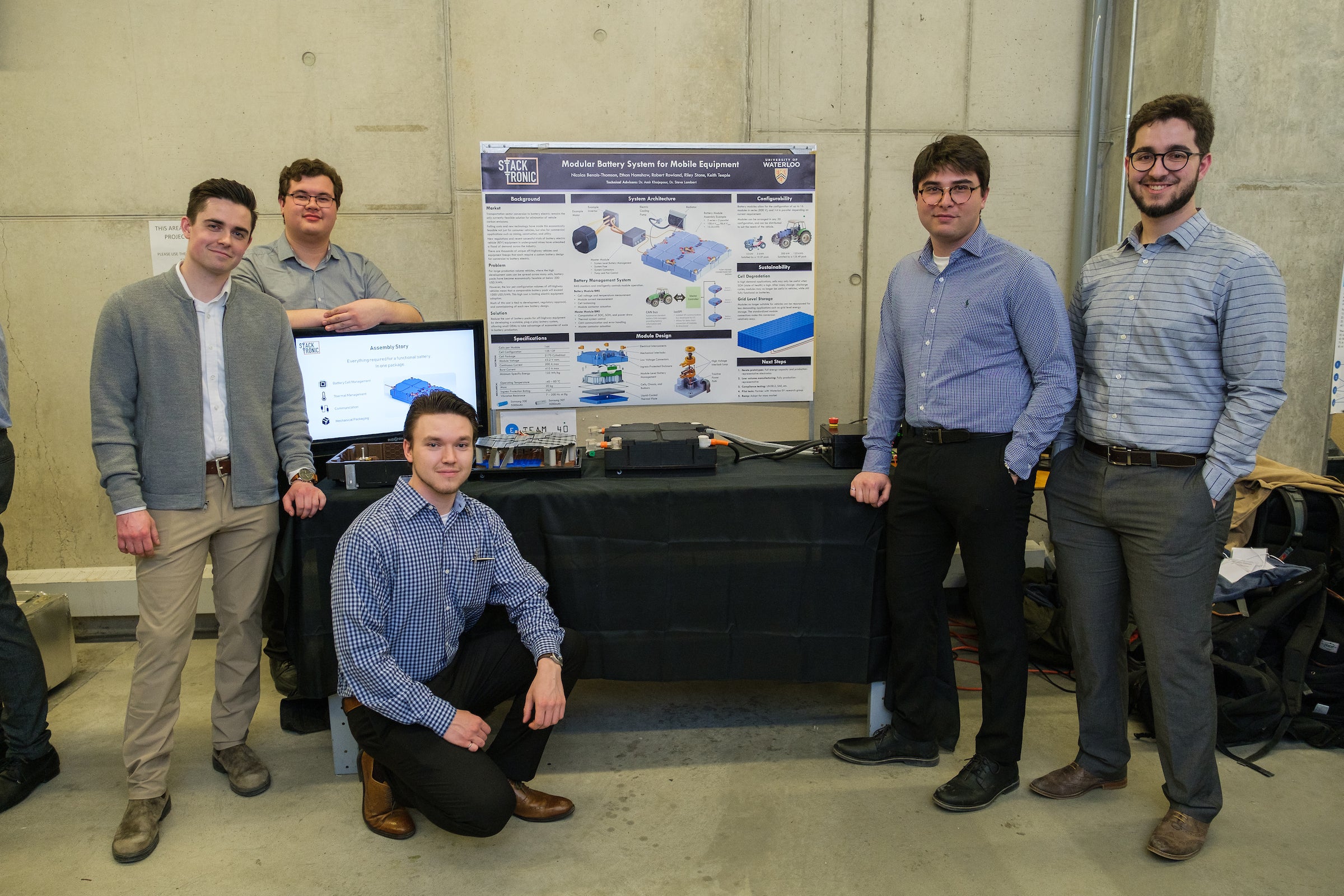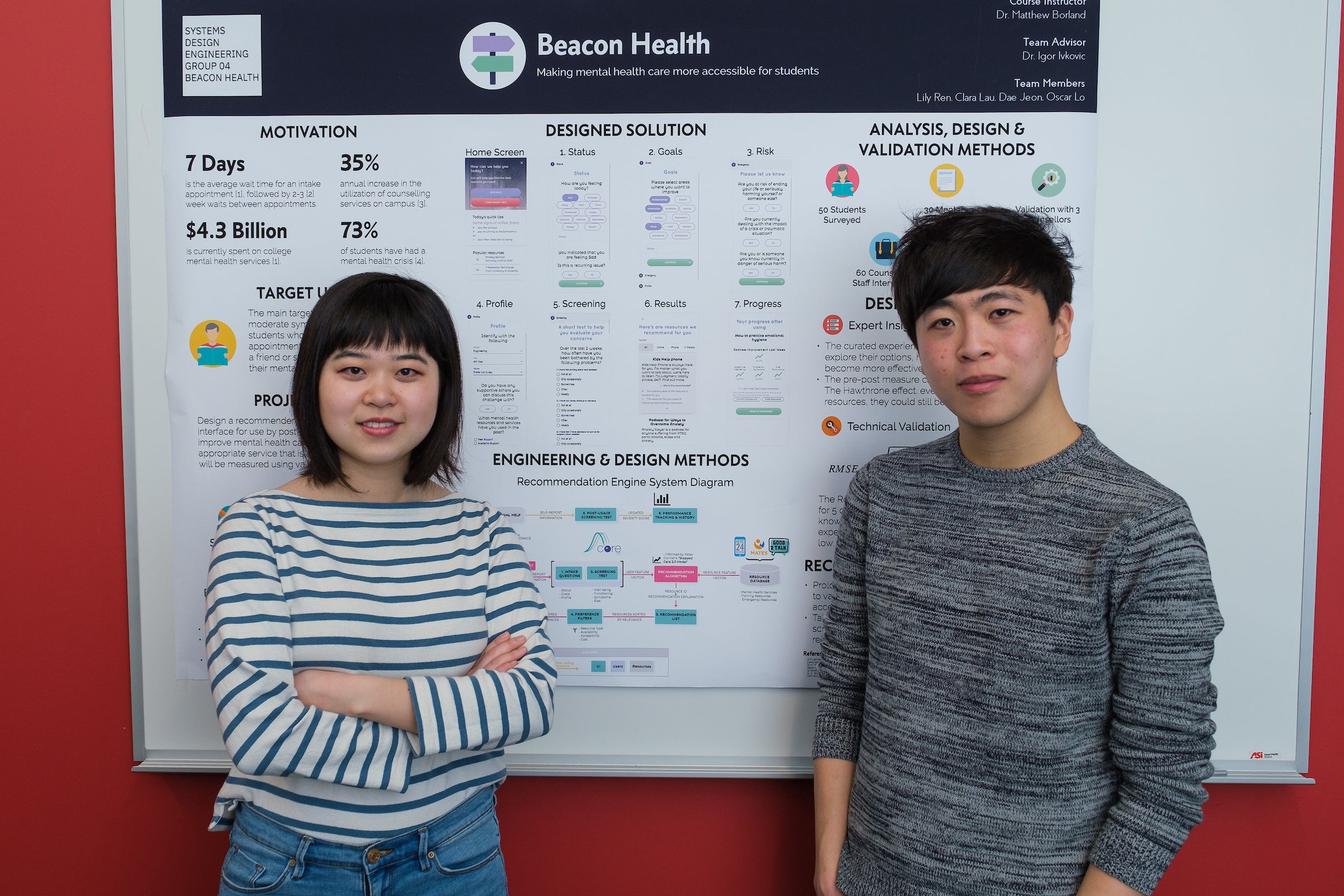Two Capstone Design teams earned a significant financial boost as winners of this year’s Palihapitiya Venture Creation Fund competition created to help transform projects into successful startups post-graduation.
Stacktronic, which is creating an inexpensive high-quality modular battery, and Beacon Health, which is developing a solution to make mental health more accessible to students, will each receive $50,000 from the fund founded and supported by electrical engineering alumnus Chamath Palihapitiya. The teams will also benefit from mentoring, training, and advice from successful entrepreneurs.
The five members of Stacktronic, a mechanical engineering Capstone Design project, are working on a plug-and-play battery system targeted to industrial equipment companies, design teams and research groups for which the high capital cost of developing something similar on their own could prohibit the conversion from fossil fuels.
When team members Robert Rowland, Ethan Hamshaw, Keith Teeple, Riley Stone and Nicolas Benais-Thomson initially discussed potential Capstone Design projects they came up with a long list of different ideas from an automated Rubix Cube to an automatic molding system.
“We eventually arrived at the battery pack system because of its potential real world impact on the environment,” says Rowland.
Rowland spent co-op terms working for companies including Tesla Inc. and for the University’s Mechatronic Vehicle Systems Lab. While working in the lab, he was part of the development process for prototyping electric vehicles and often ran into difficulty finding batteries in scalable energy capacities, different volume form factors and different voltages.
“A small group, like a research lab, doesn’t usually have the resources to build a small battery pack,” says Rowland. “In talking to the lab directors and a few other people we found there’s a need for an off-the-shelf solution that can be scaled into multiple integrations.”
Team members conducted an extensive study of the power requirements for vehicles on the market and then tailored its battery prototype to service the maximum number of them.
Stacktronic captured the overall best design award at this year’s mechanical engineering Capstone Design symposium and came in third in the innovative design challenge at the Ontario Engineering Competition. It has received financial assistance from Waterloo Engineering’s Engineer of the Future Fund and the Sanford Fleming Foundation. Stacktronic is one of 15 teams competing in next week’s Norman Esch Entrepreneurship Award for Capstone Design competition for a total of $60,000 in funding.
“I don’t think we set out from the start to make a business out of this,” says Teeple. “It was through communicating with third parties and people in the industry that we realized the potential of our idea. The awards and funding we’ve won so far have reinforced that and have given us the confidence to take it forward.”
Team members plan to use the money they’re receiving from the Palihapitiya Venture Creation Fund to continue developing and testing their battery system and to purchase equipment.

Stacktronic members from left: Riley Stone, Ethan Hamshaw, Robert Rowland, Keith Teeple and Nicolas Benais-Thomson.
Improving access to student mental health
Beacon Health, a systems design engineering Capstone Design project, is designed to provide students with better access to mental health resources.
Team members have developed an online platform that uses validated screening tests to direct students to the correct resource depending on the type and severity of an individual’s mental health issue.
“Initially, we thought the answer was having more counsellors available,” says Lily Ren, a fourth-year systems design engineering student. “But then, when we learned more about the problem, we discovered the challenge is with the access to the resources and how students are connecting to them.”
Ren says her Capstone Design team came up with the idea for Beacon Health after seeing students around them suffering from mental health issues.
“Mental health is such a big issue in university,” she says. “We really want to help make a change.”
Ren and Oscar Lo, two of the four-person Beacon Health Capstone Design team, will continue developing their project after graduation. Current member Clara Lau is continuing on in school and the other current member Dae Jeon has accepted a full-time position with Orbcare. The Toronto-based company, which employs a number of Waterloo Engineering graduates and co-op students, develops innovative technology to solve workflow issues with medical practices.
Beacon Health will use the $50,000 it receives from the Palihapitiya Venture Creation Fund to help pay for further software development of its prototype, as well as for the professional support of psychologists and lawyers who specialize in mental health policies and education.

Beacon Health members from left: Lily Ren and Oscar Lo.
Members of both Beacon Health and Stacktronic were thrilled when they found out by email last week that they’d won funding from the Palihapitiya Venture Creation Fund after successfully pitching their projects to an interview panel, comprised of faculty members of Waterloo Engineering, including the Conrad School of Entrepreneurship and Business.
Rowland says he threw his hands up in the air and Ren says she jumped into the air and then went out for a drink to celebrate.
One of the requirements of winning is producing a thank you video for the fund’s donor Palihapitiya, a 1999 Waterloo electrical engineering alumnus.
“We’d love to have the opportunity to meet with him one day and to thank him personally,” says Teeple.
Palihapitiya is the founder and CEO of Social Capital, which invests in and starts breakthrough companies in areas including healthcare, education, financial services, and enterprise with the mission to advance humanity by solving the world's hardest problems.
In 2018, it was revealed that Palihapitiya made the largest individual donation of $25 million to Waterloo Engineering’s Educating the Engineer of the Future fundraising campaign that raised just over $100 million.